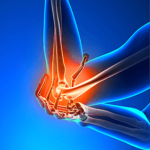



Case 1:
- a 15 year old boy who had a severe case of ‘Gamers Thumb’ which was interfering with his school life as he could no longer hold a pen for longer than two minutes without being in agonising pain in his thumbs, hands, wrists and forearms,
Case 2:
- a 29 year old woman who had been signed off work for 6 months with severe inflammation throughout her forearms, wrists and hands to the point where the hands were bright red in colour due to the levels of inflammation throughout. She previously had 12 physiotherapy sessions by both NHS (3 sessions) and a private physiotherapist (9 sessions) and had been given numerous exercises to perform which unfortunately had not resolved the issues. In her despair that she may well be losing her job she decided to try osteopathy.
In both cases the patients were successfully treated and both have made significant changes to their lives in terms of the amount of time they spend online and gaming.
The lady in question decided to change career as she didn’t want to experience that level of pain again through her hands, wrists or forearms from spending so much time on devices or on a keyboard at work.
Gamer’s Thumb & Other Common Gaming Injuries:
Gaming, phone usage, keyboards and the rise of social media has led to a great many people spending much greater lengths of time online and on their devices and a huge rise in directly related injuries.
Spending so much time online and on gaming devises creates a great deal of problems ranging from postural problems (particularly with teenagers slumping), bone density issues in the developing body ( spending too much time indoors and slouched), headaches, migraines, eyesight issues and many other pains throughout the arms, forearms, wrists and hands.
Below are a couple of cases that we have treated in recent months which highlight the potential side effects of spending so much time online:
What Is Gamer’s Thumb?
‘Gamer’s Thumb’ is one name given to a condition called de Quervain’s Tenosynovitis which is a condition where the tendons that move your thumb become inflamed.
De Quervain’s Tenosynovitis
When you grip, grasp, clench, pinch or wring anything in your hand, two tendons in your wrist and lower thumb normally glide smoothly through the small tunnel that connects them to the base of the thumb. Repeating a particular motion day after day may irritate the sheath around the two tendons, causing thickening and swelling that restricts their movement.
The inflammation in the thumb is a result of severe repetitive strain on the tendons which leads to pain and limited movement of the thumb. Gaming is a common cause of repetitive strain on the thumb, so De Quervain’s Tenosynovitis is often called ‘Gamer’s Thumb’.
Continuous use of your smartphone for gaming, messaging, social media and other usages is another way that this condition can develop. Although smartphone usage is a common cause, gaming may put more intense strains on your thumbs for longer periods of time.
How Do You Know If You Have Gamer’s Thumb?
Symptoms of ‘Gamer’s Thumb’ include:
- Thumb pain after playing video games or phone usage
- Pain and swelling near the base of the thumb
- Wrist pain that may travel up the arm to the elbow
- Thumb and wrist pain that gets worse with movement
- A catching or popping sensation when moving the thumb
How To Prevent ‘Gamer’s Thumb’
Play for shorter periods of time
- Even though that’s a tough ask for most gamers, spending less time playing will decrease your risk of developing gamer’s thumb. Would you sacrifice one extra hour of gaming time to save yourself from a very painful problem that affects the rest of your life?
Stretch before playing and during breaks
- Some very simple stretching of your hands and wrists can reduce your risk of developing gamer’s thumb.
Take frequent breaks
- Give your thumbs time to rest as some gamers play for hours on end without taking a break which then puts great strain on your thumbs.
Are There Other Injuries Caused By Gaming?
Yes. In fact, some professional gamers have had to retire due to hand and wrist injuries.
Gaming requires repetitive, strenuous motion on the hands and wrists where this strain happens for hours on end which increases your risk for a Repetitive Stress Injury (RSI).
Here are some of the common gaming injuries that we see:
- Carpal Tunnel Syndrome
- Trigger finger
- Tennis elbow
- de Quervain’s Tenosynovitis